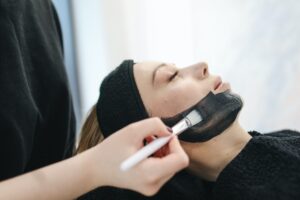Dark Spots in Skin: Causes, Prevention and Treatment

If you’ve ever noticed dark spots on your skin, you’re not alone. Dark spots, also known as hyperpigmentation, are a common skin concern that can affect people of all ages and skin types. In this blog post, we’ll discuss the causes of dark spots, how to prevent them, and the best skincare treatments for hyperpigmentation.
What Causes Dark Spots?
Hyperpigmentation occurs when your skin produces too much melanin, the pigment that gives skin its color. This can happen for a variety of reasons, including:
Sun Exposure:
UV rays from the sun can stimulate the production of melanin, leading to dark spots.
Hormonal Changes:
Hormonal changes during pregnancy, menopause, or while taking birth control pills can cause hyperpigmentation.
Inflammation:
Skin inflammation caused by acne, eczema, or other skin conditions can lead to hyperpigmentation.
Age:
As we age, our skin produces less collagen and elastin, which can lead to dark spots.

Preventing Dark Spots with Skincare
Preventing dark spots starts with good skincare habits. Here are some tips to help prevent hyperpigmentation:
- Wear Sunscreen: Protecting your skin from UV rays is crucial in preventing hyperpigmentation. Look for a broad-spectrum sunscreen with at least SPF 30, and apply it daily.
- Use Brightening Skincare Products: Ingredients like vitamin C, kojic acid, and niacinamide can help brighten and even out your skin tone.
- Avoid Picking at Your Skin: Picking at pimples or other blemishes can cause inflammation and lead to dark spots.
Treating Dark Spots with Skincare
If you already have dark spots, there are a variety of skincare treatments that can help fade them. Here are some of the most effective treatments:
- Chemical Peels: A chemical peel involves applying a solution to the skin that causes the top layer to peel off. This can help fade dark spots and improve overall skin texture.
- Retinoids: Retinoids are a type of vitamin A that can help fade dark spots and improve skin texture. They work by increasing cell turnover and promoting collagen production.
- Laser Therapy: Laser therapy involves using a laser to target and destroy the melanin in dark spots. This can be an effective treatment for stubborn hyperpigmentation.
In addition to these skincare treatments, there are also non-skincare treatments that can help fade dark spots, including microdermabrasion and cryotherapy.
Final Thoughts
Dark spots can be frustrating, but with the right skincare routine and treatment, they can be faded and prevented. Remember to always wear sunscreen, avoid picking at your skin, and use brightening skincare products. If you’re struggling with hyperpigmentation, talk to a dermatologist about the best treatment options for you.
In conclusion, hyperpigmentation is a common skin concern that can be prevented and treated with proper skincare habits and the right treatment. By understanding the causes of dark spots and taking steps to prevent them, you can enjoy healthy, glowing skin.

